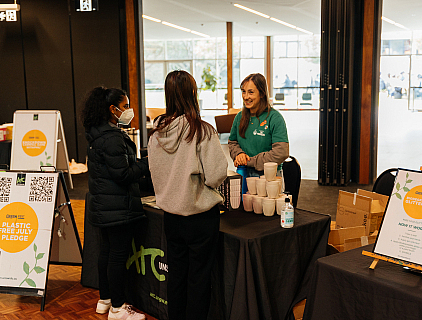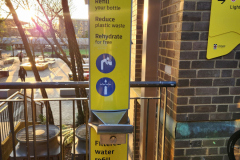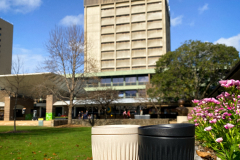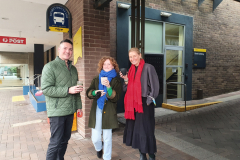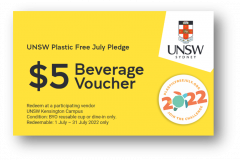UNSW: Dining on sustainable ideas
On-campus plastic-free initiatives are a great way for staff and students to start their plastic reduction journey and encourage others. UNSW Sydney uses the momentum of Plastic Free July to raise awareness and work towards the university’s vision of being single-use plastic free.
Consultation and Collaboration
With over 64,000 students from 130 countries and over 7,000 staff across its campuses, UNSW is an influential research and education institution that has established campus-wide changes to encourage behaviour change. Arifa Sarfraz, UNSW’s Manager, Environmental Sustainability, explains that priorities for change are determined after extensive consultation with students and staff in order to understand their key priorities, a process that has revealed a sustained interest in and commitment to plastic reduction initiatives.
‘In relation to single-use plastic, our consultation shows that continued action on campus is really important for staff and students,’ Arifa said.
Collaborative efforts are strengthened by timing campaigns to coincide with Plastic Free July.
‘The Plastic Free July message coming from everywhere helps us to reinforce our message,’ Arifa said. ‘Our campaigns are always well received in July because of the effort coming from Plastic Free July in general, along with all the other organisations and institutions that are on board.’
On target for sustainability
UNSW’s Environmental Sustainability Plan guides activities and outlines clear and measurable targets. To meet its targets, UNSW has adopted plastic reduction initiatives with key stakeholders as well as continuous improvement practices in waste management with the outcomes formalised in its annual Environmental Sustainability Report.
Plastic Free Dining
In 2019, analysis showed that ‘over 3 million single-use plastic food and drink packaging items were used across UNSW’s Kensington campus annually’, equivalent to around 12% of its accumulated general waste. Following 18 months of planning and engagement, Plastic Free Dining was launched, an initiative that works with on-campus food and drink retailers to encourage staff and students to BYO or dine in, with a three-bin system assisting with recycling efforts. ‘Plastic Free Dining’ focuses on making 100% of single-use packaging recyclable or compostable, removing avoidable single-use plastic packaging and reducing single-use coffee cups and water bottles. UNSW has also installed eye-catching, conveniently located water refill stations to encourage students to bring their own water bottles. More information about UNSW Plastic Free Dining program can be found on the Estate Management Sustainability website.
A flat white please – hold the plastic
Coinciding with Plastic Free July’s 2022 commitments from around the world, UNSW focused on a ‘reuse’ message, with staff and students asked to make a ‘dine plastic free and single-use free’ pledge. The initiative was supported by a social media campaign with Instagram and Facebook posts, as well as a waste quiz. These measures were leveraged with increased student-specific communications materials including flyers incorporating Plastic Free July’s Choose to Refuse logo with QR codes to find out more, as well as posts displayed on university-wide television screens. To encourage uptake, the campaign launched with 2,000 reusable coffee cups, 2,000 coffee vouchers and 20 copies of Plastic Free: The Inspiring Story of a Global Environmental Movement and Why it Matters with the results exceeding expectations.
‘We were expecting a slow start as the campaign began during the school holidays,’ Arifa said, ‘but we received almost 3000 pledges. The books and all reusable cups and vouchers were collected in the first two weeks of the July.’
Pledgers adopted a range of ‘reuse’ habits from using reusable coffee cups; bringing food containers, and utensils from home; and dining in at on-campus cafes; through to requesting straw-free drinks.
The award goes to …
To motivate campus retailers, and in recognition of their sustainability efforts, in 2021, UNSW’s Estate Management developed an award system that awards retailers gold, silver or bronze awards so students and staff are able to make informed dining choices based on criteria including reuse incentives, compostable packaging and encouragement of BYO reusable containers. The award status of each retailer can be found on the UNSW Estate Management Food and Retail website.
‘We were expecting a slow start as it started during the school holidays,’ Arifa said, ‘but we received almost 3000 pledges. The books and all reusable cups and vouchers were collected in the first two weeks of the July.’

